Celebrating BMB Graduates
Please join us in our celebration as we highlight our BMB graduates.
The profiles are sectioned by degree type:
Doctor of Philosophy
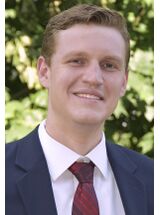
Dirk Auman
Mentor: Peter Leslie Dutton, PhD
Graduate Training in Medical Science (GTMS) Certificate
Thesis Title: Uncovering Biophysical Determinants of Oxidoreductase Function Through De Novo Protein Design

Daniel Dehelian
Mentor: Lawrence (Skip) Brass, MD, PhD
Research Video
Thesis Title: Regulators of G Protein Signaling Modulate Platelet Function to Impact Normal Physiology and the Hemostatic Response
Research and Lab Description: My thesis research focused on platelet-specific regulators of G protein signaling (RGS), intrinsic negative regulators of intracellular signaling, and their impact on normal platelet physiology and hemostasis. Our lab combines experimental, observational, and computational approaches to understand the role of blood platelets in hemostasis and thrombosis.
Post PhD Plans: My post-doctoral plans are to pursue a career in biotech intellectual property law, combining my love of science, my passion for helping others, and my aptitude for effectively conveying scientific ideas.
Mentor Comment: Dan did a great job, coming a long way from where he started, completing an important body of work, and teaching me a lot along the way. Sorry to see him go. All of us will miss him and the screwy desktop photo on his laptop that I never did understand.
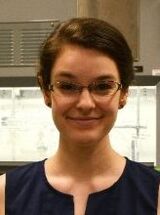
Elizabeth Dempsey
Mentor: Andrew Tsourkas, PhD
Graduate Training in Medical Science (GTMS) Certificate
Thesis Title: Engineering Novel Nanomaterials from Ultrasmall Gold Clusters for Use in Cancer Therapy
Mentor Comment: Congratulations Beth! The tenacity, attention to detail, and leadership skills that you displayed in the lab not only led to a body of work that I am extremely proud of, but will also serve you well in your future career. I wish you the best of luck!

Valentina Dimitrova
Mentor: Zhe Lu, MD, PhD
Thesis Title: Gating Mechanism Comparison Between the TRKAH and MTHK Ion Channels
Research and Lab Description: My thesis research utilizes a recently developed single-molecule fluorescence-based technique to study the energetics of ion channel activation in the bacterial protein complex TrkAH. The Lu Lab combines structural and functional approaches to investigate the fundamental mechanisms of ion channels.
Post PhD Plans: Upon completing my PhD, I will seek to obtain a post-doctoral position, preferably in the fields of chronobiology and/or sleep.
Mentor Comment: Valentina was a highly organized, intelligent, persistent, and well-liked student.

Meilin Fernandez Garcia
Mentor: Kenneth Zaret, PhD
National Research Service Award (NRSA)
Thesis Title: Mechanism of Nucleosome Targeting by Pioneer Transcription Factors
Thesis and Lab Description: My thesis work at the Zaret Lab was centered in elucidating the initial mechanisms by which transcription factors engage with chromatin to specify cell identify. Through my investigations of >500 transcription factors, we present the first studies revealing the shared structural and DNA binding features contributing to chromatin engagement of pioneer TFs and thus allow for prediction of novel pioneer TFs candidates for the development of new cell reprogramming technologies. The Zaret laboratory research is focused on the understanding of how genes are regulated in order to allow one type of cell to change into another type during cell embryonic development and tissue regeneration with the goal to generate cells at will for therapeutics and generation experimental models to unveil the basis of, and cures for, human disease.
Post PhD Plans: Postdoctoral Fellow at Dr. Kristen Brennand's lab (soon to be at Yale fall 2020, currently at Icahn School of Medicine at Mount Sinai) with the long-term goal of becoming an independent research scientist in the field of molecular neuroepigenetics and stem cell biology applied to psychiatry.
Mentor Comment: Meilin was an irrepressible bundle of energy, eager to pursue her projects to the very limit. It was a pleasure to have a student so enthusiastic about doing quantitative biochemical analyses. As I got to know Meilin further, I learned about her many talents, including adventure travel around the world, cooking, dancing, and more. Meilin was a much-beloved member of the lab and stays in touch as an active alumnus!
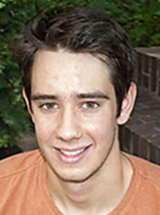
Alejandro Gozalo
Mentor: Maya Capelson, PhD
Thesis Title: Core Components of the Nuclear Pore Bind Unique States of Chromatin and Mediate Polycomb Repression
Research and Lab Description: My thesis research focused on understanding differences in the chromatin binding and gene regulatory roles of stable/strucutral Nuclear Pore proteins. The Capelson lab studies how the Nuclear Pore assists in genome organization and gene regulation.
Post PhD Plans: I will be working at ClearView Healthcare partners (A life sciences consulting firm) in Boston, MA as a consultant.
Mentor Comment: Alejandro's beautiful thesis work lead to exciting discoveries in the field of nuclear genome organization. Thanks to his biochemical talents, he was able to map where core nuclear pore proteins, which are very difficult to work with, bind in the genome, and to functionally implicate one of these proteins in developmental gene silencing. Congratulations, Alejandro!

Enrique Lin Shiao
Mentor: Shelley L. Berger, PhD
Public Health Certificate Program (PHCP)
National Research Service Award (NRSA)
Thesis Title: Establishment and Regulation of Epithelial Enhancers by P63
Research and Lab Description: Enrique’s thesis was centered on the role of transcription factor p63 in epithelial enhancer establishment and how this is disrupted in cleft lip and cleft palate. Enrique did his PhD in the lab of Prof. Shelley L Berger, PhD. The Berger lab studies epigenetic mechanisms in development, aging, health and disease.
Post PhD Plans: Enrique is currently a postdoc in the lab of Prof Jennifer A Doudna at the University of California, Berkeley. Since the pandemic he is currently co-leading the technical team at the UC Berkeley covid19 testing group.
Mentor Comment: Enrique represents the best of both scholarship and citizenship in our graduate students at Penn – and these remarkable personal qualities were recognized this year in winning the prestigious Tom Kadesch award in Genetics. His work on the transcription factor p63 in cleft/lip palate was both a tour-de-force of molecular and genomic biology and revealed driving transcriptional regulatory mechanisms that underlie this common developmental syndrome. Enrique was an exceptional contributor to the Penn community for his work towards international diversity in the STEM disciplines, and a beloved member of my lab owing to his inspirational and warm personal qualities. Best of luck to Enrique in his post-doctoral studies with Jennifer Doudna at Berkeley!

Korrie Mack
Mentor: James Shorter, PhD
National Science Foundation (NSF) Award
Thesis Title: Engineering Protein Disaggregases to Counter Alpha-Synuclein and Amyloid-Beta Neurotoxicity
Research and Lab Description: My thesis research focused on engineering Hsp104, a protein disaggregase found in yeast, to selectively counter toxicity of proteins that misfold in neurodegenerative diseases. The Shorter lab studies protein folding and misfolding, and how to disaggregate and mitigate toxicity of misfolded proteins underlying a range of neurodegenerative diseases.
Post PhD Plans: I am currently a postdoctoral fellow in the neuroscience department at Merck.
Mentor Comment: Korrie Mack is the brightest prospect you are ever likely to see. She is fearless, smart, resourceful, and tenacious. She has done great things in her Ph.D. and is a truly exceptional young scientist.

Daniel McCracken
Mentor: Frank J. Rauscher, PhD
Thesis Title: Twist, Snail, and SOX9 Form an Allosterically Regulated Complex, the EMTosome, on a Bipartite E-Box Site
Research and Lab Description: The molecular mechanisms of the transcriptional regulation of epithelial mesenchymal transition during cancer metastasis are controlled by an allosteric mechanisms which selects for portions of that genetic regulatory program based upon DNA binding of other transcription factors in the same multiprotein complex, the EMTosome. The Rauscher lab has been researching the protein biochemistry of the molecular mechanisms of the pathology of cancer on a genetic level for 30 years at The Wistar Institute. (Lab is now closed).
Post-PhD plans: Accepting a position at Merck as a Senior Scientist doing processing, purification, and characterization of proteins, peptide, and virus-like particles to support vaccine development.
Mentor Comment: Daniel McCracken receives his PhD today for a superb project on the biochemistry of complexes required for the epithelial-mesenchymal transition, or EMT, which is a critical process in tumorigenesis. Through this project he has worked extremely hard, overcome many hurdles, and through it all behaved with intelligence and grace. He is the epitome of grit and we are proud to call him one of our graduates. ~Maureen Murphy

Kristen McKibben
Mentor: Elizabeth Rhoades, PhD
Thesis Title: Tau Interdomain Relationships: Re-examining the Role of the Proline Rich Region in Tau's Structure and Function in Vitro
Research and Lab Description: My thesis focused on the intrinsically disordered protein tau and its interdomain relationships upon binding to the cytoskeletal element tubulin ultimately yielding a refined polymerization model. The Rhoades lab studies intrinsically disordered proteins using single-molecule techniques to understand underlying phenomena that dictate these heterogeneous ensembles.
Post PhD Plans: I am moving to Switzerland and switching fields to bioengineering.
Mentor Comment: Kristen is creative, persistent and very hard working in the lab. She was the lab's cloning wizard and we will miss that a lot!

Jane Schulte
Mentor: Mark Goulian, PhD
National Science Foundation (NSF) Award
Thesis Title: Functional Analysis of a Bacterial Phosphohistidine Phosphatase
Mentor Comment: Jane seems to take an experimental approach to almost everything. She tends to view rules of thumb, or "what is usually done" with some skepticism, and she keeps an open mind towards the alternatives. I find it inspiring.

Shufei Song
Mentor: F. Bradley Johnson, MD, PhD
American Heart Association (AHA) Award
Thesis Title: Rap1-Mediated Chromatin and Gene Expression Changes at Senescence

Matthew Thompson
Mentor: Kristen W. Lynch, PhD
Thesis Title: Functional and Mechanistic Insights into Host and Viral Alternative Splicing Regulation During Influenza Infection
Mentor Comment: Matthew Thompson pioneered a new direction in the Lynch lab, working on viral splicing and the impact of viral infection on the splicing of host genes. He was fearless in learning new and diverse techniques and became the lab expert in virology. His work has seeded several on-going projects in the lab, while he continues to expand his knowledge of virology and RNA as a postdoc with Dr. Stacy Horner at Duke.
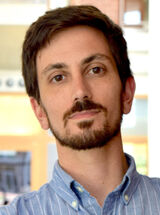
Michael Woody
Mentor(s): Yale E. Goldman, MD, PhD; Michael Ostap, PhD
National Science Foundation (NSF) Award
Thesis Title: Optical Trapping Studies of the Mechano-Chemical Coupling of Force Generation and Phosphate Release in Cardiac Myosin
Mentor Comment: Michael is an extraordinary scientist and intellect who made new discoveries about the fundamental mechanisms of cardiac contractility and a drug to treat heart failure. To achieve this progress, he designed and built new technology for single-molecule biophysical measurements for angstrom-level spatial measurements on the submillisecond time scale. Congratulations Michael – we wish you the best of luck in all your future endeavors!
Combined Degree, MD-PhD
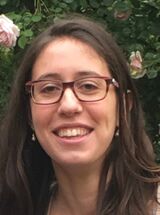
Katherine Szigety
Mentor: Sarah E. Millar, PhD
National Research Service Award (NRSA)
Thesis Title: HDAC3 Ensures Stepwise Epidermal Stratification via NCoR/SMRT-Reliant Mechanisms Independent of its Histone Deacetylase Activity
Research and Lab Description: My thesis research characterized the role of the epigenetic regulator histone deacetylase 3 (HDAC3) in embryonic epidermal development. The Millar lab studies cell signaling pathways and epigenetic mechanisms that regulate the development and maintenance of epithelial tissues and ectodermal appendages.
Post-PhD Plans: I am now back in medical school and planning to apply for residency this year.

Eduardo Torre Valdivieso
Mentor: Arjun Raj, PhD
Thesis Title: Quantitative Characterization and Regulation of Single Cell Non-Genetic Variability in Melanoma

Hejia Henry Wang
Mentor: Andrew Tsourkas, PhD
Saul Winegrad Dissertation Award Recipient
National Research Service Award (NRSA)
Thesis Title: Cytosolic Delivery of Inhibitory Antibodies with Cationic Lipids
Research and Lab Description: My thesis research focused on using chemical biology and protein engineering to develop a system for delivering inhibitory antibodies into the cytosol of cells by complexing them with cationic lipids. The Tsourkas lab uses protein engineering and nanotechnology to create novel targeted imaging and therapeutic agents.
Post-PhD Plans: I am finishing the MD-PhD program at Penn, expecting to graduate in May 2021.
Mentor Comment: Congratulations Henry! It was an absolute pleasure to have you in the lab and witness your unparalleled creativity and commitment to your project on a day-to-day basis. I can’t wait to see what you are able to accomplish in your future career. Best of luck!


